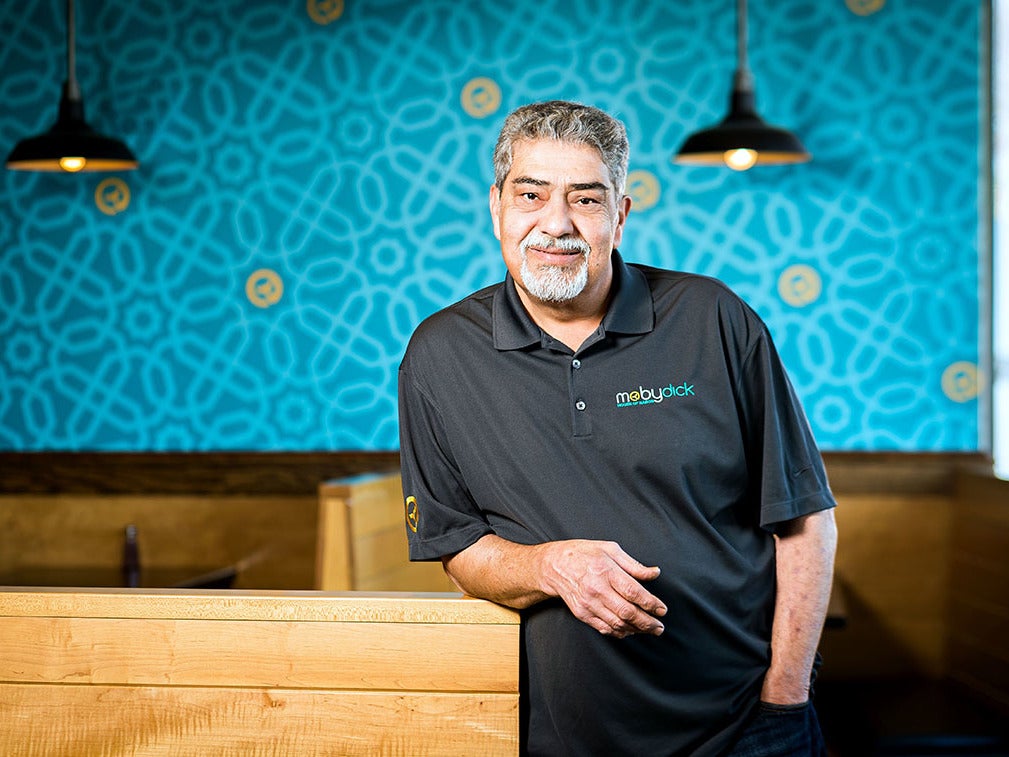Mike Daryoush: Iranian-American kebab king whose Moby Dick restaurants helped put Persian food on the map
The immigrant entrepreneur sought to put his best foot forward as a cultural ambassador in the US – with the humble kebab

Mike Daryoush’s first restaurant – Moby’s Luncheonette in Bethesda, Maryland – was a typical American breakfast-and-lunch joint, with fare including steak-and-cheese sandwiches, Reuben sandwiches – corned beef, Swiss cheese and sauerkraut in rye – and tuna melts.
He opened the eatery in 1987 with $36,000 he saved after leaving his native Iran in his early twenties and settling in the United States, where he worked as a dishwasher, a waiter and a bartender.
Struggling to distinguish his restaurant from the profusion of similar lunch establishments, Daryoush installed a clay oven used to make traditional Iranian naan. The new offering proved popular – encouraging him to expand his menu to include other Iranian specialties and marking the beginning of his restaurant’s rebirth as Moby Dick House of Kabob.
Daryoush, whose popular fast-casual chain grew over three decades to include 24 locations across the Washington region and gave many local diners their first taste of Persian food, ran the business with his son Ned , who is vice president of the business.
When Daryoush replaced Moby’s Luncheonette with the first Moby Dick House of Kabob in 1989, he had “two purposes”, he once told a publication of the US State Department: “To make a lifetime career, and to support the Iranian culture.”
“Through the stomach is a good way of reaching people,” he added
Moby Dick appetisers today include a dish of sauteed eggplant and yoghurt, called kashk bademjan, and the yoghurt shallot dip must-o-mooseer. Platters feature marinated ground beef called kubideh, chenjeh grilled steak, lamb barreh and joojeh grilled chicken breast.
The kebabs, restaurant critic Phyllis C Richman once wrote in The Washington Post, “are as lean as one could wish, well marinated and crisp-edged from the open grill. They’re generously portioned, and grilled carefully so they’re cooked through but not dried out”.
The platters are served with basmati rice, dotted with saffron and sumac. But the bread, Richman wrote, was the “drawing card at Moby Dick”.
“The breadmaker apportions and weighs balls of dough, then rolls them out one at a time, scores them so they don’t balloon in the oven, stretches them to fit over a large white cushion and then – using that cushion as a kind of puffy potholder – slaps them against the sides of the oven,” she wrote in 1994. “In a few minutes, when the flat breads are browned and blistered, he removes them and hangs them up to cool. The process is hypnotic, and the resulting bread has a fragrant wheatiness.”
Daryoush’s operation was cited as one of numerous Iranian-owned businesses that have thrived in the Washington area since the 1979 Iranian Revolution brought an influx of Iranian immigrants to the region. “Before the explosion of quick-service restaurants and the appearance of globally inspired eateries on every corner, Moby Dick was ahead of its time,” a writer for the website Eater DC observed in 2017.
Mike Daryoush was born in the Iranian city of Shiraz in 1953. His father died of appendicitis before he was born, and his mother died of a heart ailment when Daryoush was eight.
Daryoush lived with an aunt before moving in the mid-1970s to the United States, where he began going by the name Mike. He studied electrical engineering at George Washington University, then began his work in the restaurant industry. He became a US citizen in 2001.
His marriage to Laura Rogers ended in divorce. Survivors include his wife of 17 years, Suzan Behpour; two sons from his first marriage, Ned and Josh; and two sons from his second marriage, Aarod and Aaram Daryoush..
A frequent question from Moby Dick patrons was the provenance of the restaurant’s name. By one account, Moby Dick House of Kabob was named after a Tehran establishment that catered to US Embassy workers before the revolution. By another, one of Daryoush’s business partners was reading Herman Melville’s classic novel when they opened the original location.
For the American palate, Daryoush tempered the spiciness of some Persian dishes and used less butter in his rice. He traced his success in part to his own perseverance, but also to the curiosity of his patrons. “This food is the new wave of taste for Americans,” he said in 2003. “In the United States, people are not afraid of trying.”
Mike Daryoush, Iranian-American restaurateur, born 7 March 1953, died 9 May 2019
© The Washington Post
Subscribe to Independent Premium to bookmark this article
Want to bookmark your favourite articles and stories to read or reference later? Start your Independent Premium subscription today.

Join our commenting forum
Join thought-provoking conversations, follow other Independent readers and see their replies